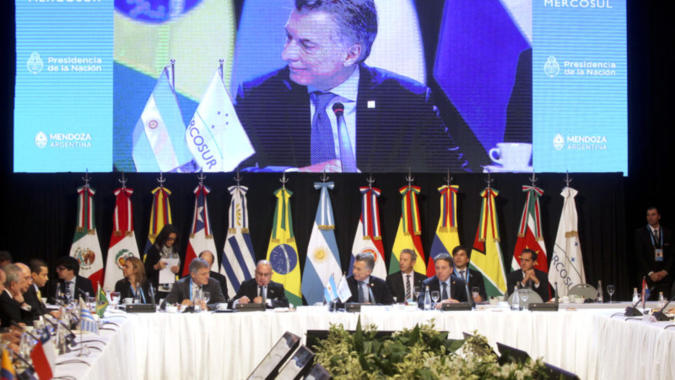Mercosur nations prioritise end-of-year EU trade deal

EurActiv | 25.7.2017
Mercosur nations prioritise end-of-year EU trade deal
By Natalia Kidd | euroefe.es | translated by Sam Morgan
At its biannual summit last week, South American trade bloc Mercosur confirmed that it intends to finalise an agreement with the EU by the end of the year. But experts warn that this timeframe might be too ambitious for a full-blown deal. EURACTIV Spain reports.
In its final declaration, signed in the Argentine city of Mendoza, Mercosur members Argentina, Brazil, Paraguay and Uruguay highlighted that renewed talks with Brussels are one of the bloc’s most successful recent advances.
Plans for a Mercosur-EU deal date back to a cooperation agreement signed in 1995 that entered into force in 1999 but talks only began in earnest in Buenos Aires in April 2000. Since then, 28 rounds of negotiations have been held, with various impasses that have lasted for years.
Talks resumed in May 2016 when both parties exchanged offers and two new rounds of negotiations have been held this year, with the last one held in Brussels earlier this month. Both sides agreed to “move quickly in order to conclude negotiations”.
The next round will be held in Brasilia, in October, preceded by a meeting scheduled for Brussels in September.
Thanks to this renewed momentum, both blocs have made comments in recent weeks to the effect that a final deal will be announced in December at the World Trade Organisation’s 11th ministerial conference in Buenos Aires.
“Mercosur’s participation in world trade should increase significantly and that is why trade agreements have been prioritised. We are moving forward with a view to finalising the EU deal in December this year,” Argentina’s new foreign minister, Jorge Faurie, revealed on Friday (21 July).
“The United States is turning more protectionist and we need to counter that. Trump’s position has convinced others to side with pursuing international trade integration,” explained the CEO of consulting firm Desarollo de Negocios Internacionales, Marcelo Elizondo.
For the trade expert, reaching an agreement is “more than just a statement and would be a very strong milestone” but added that in December it is more likely like a strong political agreement will be signed, rather than a full trade agreement. Elizondo cautioned that the deal will need more time.
Even if negotiators were able to conclude by the end of 2017, a complex parliamentary ratification process and necessary translation of the deal’s content would extend the timeframe further.
Consultancy firm ABECEB’s director, Dante Sica, predicted that “two or three years more” will be needed but praised the “political alignment” of Mercosur’s governments and the business sector.
For the South American bloc, a deal with the EU would help it tap into a 500-million-strong market, which is already its main trading partner.
According to data from the European Commission, in 2016 the EU exported goods to the Mercosur countries worth €43.2bn and imported €41.6bn.
Dante Sica insisted that an agreement with the EU would be seen as a “seal of quality” that could “accelerate” Mercosur’s other negotiations and increase European companies’ interest in the continent, as it would reduce investment risk.
“Many European companies are going to want to position themselves both in Argentina and Brazil, the two biggest economic players in the bloc, before trade really starts to grow,” he added.





